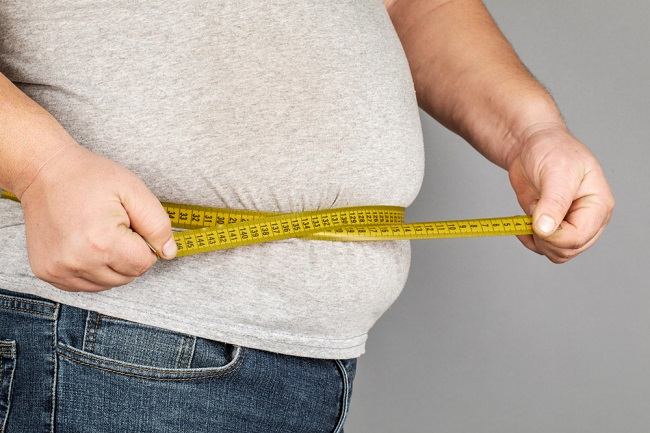Efektifitas antidepresan fluoxetine sebagai anti obesitas sudah di paparkan dalam 10 tahun terakhir ini. Beberapa penelitian mengungkapkan adanya penurunan berat badan pada pasien obesitas yang diberikan terapi fluoxetine, namun penelitian ini juga disertai dengan perubahan pola makan dan aktivitas olahraga. Sampai saat ini, belum ada penelitian lebih lanjut yang menjelaskan efek samping jangka panjang pada pemberian obat ini terhadap obesitas.
Kelebihan berat badan (overweight) dan obesitas adalah akumulasi lemak yang berlebihan dan mengganggu kesehatan. Kelebihan berat badan ditunjukkan oleh indeks massa tubuh (IMT) > 25 dan obesitas adalah IMT > 30. Obesitas telah menjadi salah satu beban penyakit tidak menular di dunia. Prevalensi masalah ini meningkat di seluruh dunia, baik di negara maju, berkembang, maupun negara miskin. [1,2] WHO melaporkan bahwa pada tahun 2016, sebanyak 39% populasi usia 18 tahun ke atas mengalami kelebihan berat badan dan sebanyak 13% mengalami obesitas. Prevalensi obesitas meningkat 3 kali lipat dari tahun 1975. [1]
Obesitas merupakan faktor risiko untuk berbagai penyakit degeneratif (seperti penyakit kardiovaskular, diabetes, dan kanker) dan merupakan salah satu kontributor utama kematian di dunia. Penyebabnya adalah intake yang berlebihan atau kurangnya aktivitas fisik. Kelebihan berat badan dan obesitas merupakan keadaan yang bisa dicegah. [1,3]
Saat ini belum telah banyak dikembangkan berbagai metode diet dan aktivitas fisik untuk mengatasi hal ini, namun belum ada farmakoterapi yang direkomendasikan untuk mengatasi kelebihan berat badan dan obesitas.
Cara Kerja Antidepresan dalam Manajemen Obesitas
Antidepresan golongan selective serotonin reuptake inhibitor (SSRI) fluoxetine dilaporkan bisa mengendalikan perubahan nafsu makan sehingga bisa menurunkan intake makanan dan normalisasi pola makan yang bermasalah. Hal ini menyebabkan obat ini bisa digunakan dalam manajemen obesitas. [2]
SSRI bekerja dengan cara menghambat reuptake serotonin dan meningkatkan konsentrasi serotonin ekstraseluler. Serotonin dilaporkan berhubungan kondisi kelaparan dan tingkat energi yang rendah. Peningkatan signaling serotonin di sistem saraf pusat berhubungan dengan penurunan intake makanan, perubahan pilihan makanan, perubahan endokrin (peningkatan kadar hormon adrenocorticotropin, corticosterone, dan prolaktin), serta normalisasi pola makan yang tidak wajar. [2]
Penelitian pada binatang menunjukkan bahwa peningkatan signaling serotonin di nukleus paraventrikular bisa menekan intake makanan melalui aktivasi reseptor 5HT2C. Reseptor 5HT1B juga berhubungan sistem yang mengendalikan nafsu makan. [4]
Antidepresan yang Digunakan dalam Manajemen Obesitas
Fluoxetine menurunkan intake kalori melalui pengaruhnya terhadap selera makan. Fluoxetine menurunkan selera makan sebelum dan sesudah konsumsi kalori, menurunkan selera makan sebelum jam makan, dan mengurangi intake kalori ketika makanan tidak dibatasi. Ada juga spekulasi yang menyatakan bahwa fluoxetine juga bisa meningkatkan kebutuhan energi ketika istirahat. [5,6]
Kelebihan Penggunaan Antidepresan Sebagai Anti Obesitas
Sebuah review oleh Serralde et al. dengan total 2216 subjek pasien menemukan bahwa manajemen dengan obesitas dengan fluoxetine menunjukkan rata-rata penurunan berat badan 2.7 kg. Dosis fluoxetine yang digunakan sebagai obat untuk manajemen obesitas adalah 20 - 60 mg per hari. [2]
Penelitian uji klinis tahun 2005 yang menyertakan 201 pasien di India juga menunjukkan bahwa fluoxetine efektif menurunkan berat badan pasien dengan obesitas sebesar 3,24 kg pada minggu ke 4 dan 6,67 kg pada minggu ke 8 terapi, serta tidak didapatkan adanya penambahan berat badan pada 4 minggu pasca penghentian obat. [3]
Hal serupa juga di laporkan pada penelitian randomized control trial oleh Guimaraes et al. pada tahun 2006 yang dilakukam pada 35 pasien obesitas. Fluoxetine bisa menurunkan berat badan, bahkan lebih superior dibandingkan obat anti-obesitas lain. [7]
Sertraline (golongan SSRI) juga dilaporkan bisa digunakan untuk menurunkan berat badan pada obesitas, meskipun efektivitasnya lebih lemah dibandingkan fluoxetine. Penggunaan sertraline menghasilkan penurunan berat badan sebesar 0,45-0,91 kg dalam periode 8 - 16 minggu. [8]
Obat golongan SSRI lain yang pernah diteliti untuk digunakan pada pasien dengan obesitas adalah fluvoxamine dan citalopram. Fluvoxamine bisa menurunkan berat badan namun tidak signifikan, namun bisa menurunkan frekuensi makan pada binge eating disorder. Sementara citalopram tidak bisa menurunkan berat badan, namun efektif mengatasi binge eating disorder. Penelitian pada obat golongan serotonin-noradrenaline reuptake inhibitor (SNRI) venlafaxine juga menunjukkan hasil yang sama dengan citalopram. [4]
Antidepresan lainnya yang dilaporkan mempunyai efek menurunkan berat badan adalah golongan noradrenaline and dopamine reuptake inhibitor (NDRI) bupropion, namun efek ini hanya ditemukan pada pasien depresi yang mengalami obesitas. Namun data penelitian mengenai hal ini masih terlalu sedikit. [9]
Kekurangan Penggunaan Antidepresan sebagai Anti Obesitas
Meskipun fluoxetine dilaporkan bisa menurunkan berat badan pada pasien dengan obesitas, namun pasien obesitas yang mendapatkan fluoxetine juga dua kali lebih sering mengalami efek samping dibandingkan kontrol seperti keliyengan, mengantuk, fatigue, insomnia dan mual. [2]
Penggunaan SSRI dan SNRI pada fase akut dilaporkan justru menimbulkan penurunan berat badan sehingga sering digunakan pada penanganan awal pasien obesitas dengan binge eating disorder. Namun pada jangka panjang justru menimbulkan risiko peningkatan berat badan. [10] Risiko peningkatan berat badan ini bertahan sampai 5 tahun pasca penghentian obat. [11] Hal ini menjadikan SSRI dan SNRI tidak ideal digunakan sebagai manajemen jangka panjang untuk obesitas.
Kesimpulan
Obat antidepresan golongan SSRI, khususnya fluoxetine, dilaporkan bisa membantu pasien dengan obesitas untuk menurunkan berat badan. Namun farmakoterapi tetap harus dikombinasikan dengan modifikasi diet dan perubahan gaya hidup. Obat hanya digunakan sebagai terapi penunjang saja. Obat tidak boleh dijadikan modalitas utama untuk menurunkan berat badan.
Obat golongan SSRI yang dilaporkan bisa menurunkan berat badan adalah fluoxetine dan sertraline. Obat SSRI lainnya mempengaruhi pola makan, namun tidak berhubungan dengan penurunan berat badan. Obat golongan NDRI bupropion juga efektif menurunkan berat badan, meskipun hanya pada pasien dengan depresi.
Obat golongan SSRI meningkatkan serotonin, neurotransmitter yang mempengaruhi intake kalori, pilihan makanan, perubahan endokrin, dan pola makan yang bermasalah. Meskipun bisa menurunkan berat badan, namun SSRI bukanlah modalitas farmakoterapi yang efektif untuk obesitas. SSRI mungkin bermanfaat pada pasien-pasien depresi yang mengalami obesitas atau kelebihan berat badan atau pada pasien yang mempunyai binge eating disorder.
Penggunaan antidepresan SSRI dan SNRI pada fase akut bisa menurunkan berat badan, namun terdapat risiko peningkatan berat badan pada penggunaan jangka panjang. Hal ini harus dijadikan pertimbangan dalam pengambilan keputusan untuk manajemen obesitas.
















